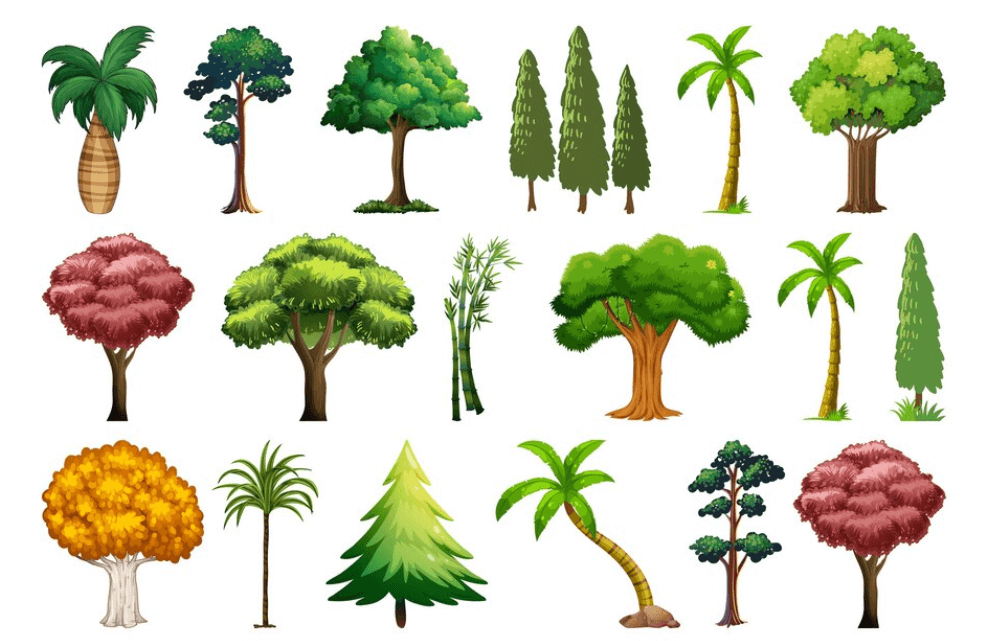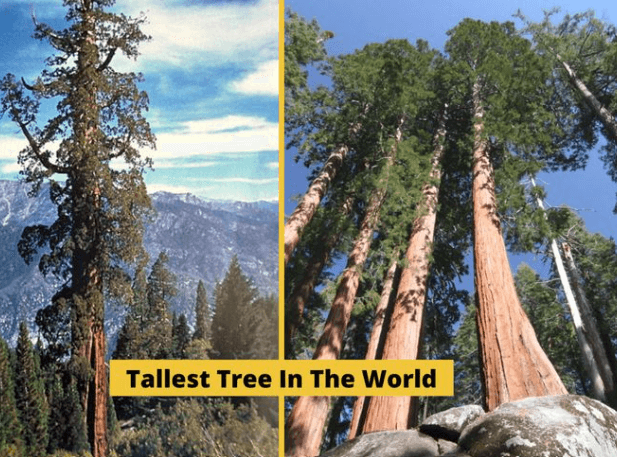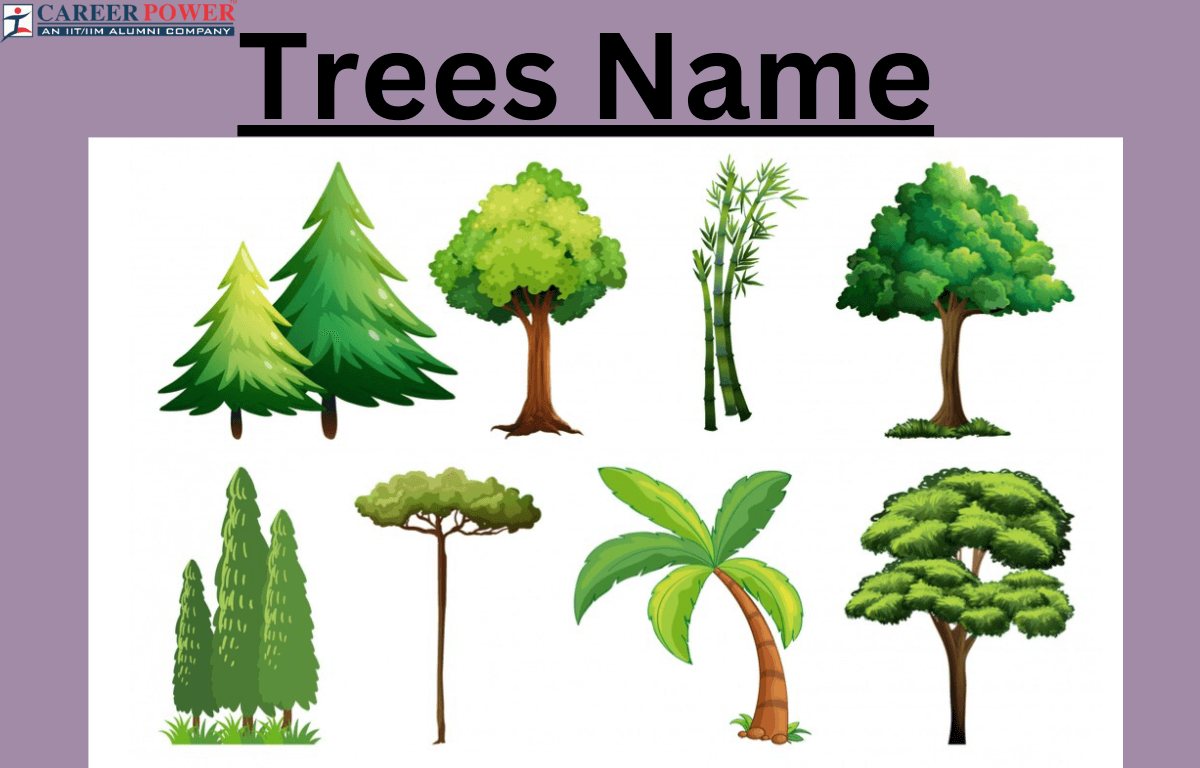Table of Contents
Trees are vital for Earth’s balance. Trees play a crucial role in maintaining ecological balance. They produce oxygen, absorb carbon dioxide, provide habitat for diverse species, prevent soil erosion, and contribute to the overall well-being of the environment. Additionally, trees offer aesthetic, recreational, and economic benefits to human communities. Here we have discussed a few other details related to trees, their features, and many different names of trees.
Tree
A tree is a tall, living plant with branches and leaves. It has a main stem called a trunk that supports the branches. Trees come in various shapes and sizes, from towering giants like redwoods to smaller ones like apple trees. Leaves on trees help them make food through a process called photosynthesis. Roots anchor the tree in the soil and absorb water and nutrients. Trees play a crucial role in our environment by producing oxygen, providing a habitat for animals, and offering shade. They can be deciduous, shedding their leaves in fall, or evergreen, keeping leaves year-round. Trees contribute to the beauty of nature and are vital for maintaining a healthy ecosystem.

Some Common Examples of Tree Names in English
Below we have discussed a few common trees names:
- Palm Tree
- Apple Tree
- Mango Tree
- Peach Tree
- Olive Tree
- Lemon Tree
- Orange tree
- Cedar Tree
- Larch Tree
- Dogwood Tree
- Pine Tree
- Fir Tree
- Black Pine Tree
- Red Elderberry Tree
- Black Mulberry Tree
- Sweetgum Tree
- Boxwood Tree
- Balsam Tree
- Butternut Tree
- Swamp White Oak
List of 50+ Tree Names in English
Here we have discussed a list of 50+ different vegetable names written in a table in English.

| 50+ Different Trees Name | |||
| Oak Tree | Poplar Tree | Apple Tree | Walnut Tree |
| Pine Tree | Spruce Tree | Orange Tree | Chestnut Tree |
| Maple Tree | Palm Tree | Mango Tree | Eucalyptus Tree |
| Birch Tree | Ash Tree | Olive Tree | Aspen Tree |
| Willow Tree | Beech Tree | Baobab Tree | Linden Tree |
| Cedar Tree | Cypress Tree | Sequoia Tree | Pecan Tree |
| Redwood Tree | Fir Tree | Juniper Tree | Ginkgo Tree |
| Cherry Tree | Sycamore Tree | Mahogany Tree | Dogwood Tree |
| Elm Tree | Magnolia Tree | Acacia Tree | Banyan Tree |
| Redbud Tree | Hemlock Tree | Hazel Tree | Cypress Tree |
| Alder Tree | Hornbeam Tree | Yew Tree | Teak Tree |
| Cottonwood Tree | Sassafras Tree | Alder Tree | Sweetgum Tree |
| White Oak | Locust | Hickory | Ginkgo Tree |
Which is the Tallest Tree In the World?
The tallest tree in the world is a coast redwood named Hyperion. Found in California’s Redwood National Park, Hyperion stands at about 379.7 feet [115.7 meters] tall. This giant tree was discovered in 2006 by the naturalists Chris Atkins and Michael Taylor. The exact location of Hyperion is kept secret to protect it from damage. Coast redwoods are known for their incredible height, and they can live for over 2,000 years. Hyperion’s height is a result of the ideal conditions in its habitat, including plenty of rain and a moderate climate.

Which Tree is Known as the God Tree?
The tree known as the “God Tree” is the Banyan tree. In many cultures, especially in India, it is considered sacred. People believe that gods and spirits live in this tree. The Banyan tree is huge and has long branches that drop down and grow into new roots, making it look like a small forest. It provides shade, shelter, and food for many animals and birds. People often gather under its wide canopy for meetings and prayers. Because of its size and age, it symbolizes immortality and longevity. The Banyan tree is respected and protected as a gift from nature.
Different Features of Trees
Trees in various contexts have different features. Here are some common features associated with different types of trees. Understanding these features helps in identifying and appreciating the diversity and importance of trees in various ecosystems.
Botanical Features:
- Leaves: Shape, arrangement, and type of leaves can vary.
- Bark: Texture, color, and pattern of the tree’s outer bark.
- Flowers: Appearance, color, and structure of flowers, if applicable.
Structural Features:
- Branching: Pattern and angle of branching, which can be alternate or opposite.
- Root System: Types of root system, such as taproot or fibrous root.
Lifecycle Features:
- Deciduous vs. Evergreen: Trees may shed their leaves annually (deciduous) or retain them year-round (evergreen).
- Reproductive Structures: Types of fruits, seeds, or cones produced.
Size and Shape:
- Height: Trees vary widely in height, from small shrubs to towering giants.
- Canopy Shape: Some trees have a spreading canopy, while others are more columnar.
Environmental Adaptation:
- Drought Resistance: Some trees are adapted to arid environments.
- Cold or Heat Tolerance: Adaptations to withstand extreme temperatures.
Economic and Practical Uses:
- Timber: Quality and uses of wood.
- Fruit/Nuts: Edible products, if any.
- Medicinal Properties: Some trees have medicinal value.
Habitat and Geographic Distribution:
- Native Range: Trees have specific regions where they naturally occur.
- Ecological Role: Some trees play crucial roles in ecosystems.
Cultural and Symbolic Significance:
- Symbolisms: Trees may hold cultural or religious significance.
- Landscaping Value: Ornamental use in gardens and parks.
Famous Trees Names in English with Description
Here we have discussed some other famous examples of trees with their descriptions:
| Most Famous Trees Name with Description | |
| Trees Name | Description |
| Oak Tree | The Oak tree is a broad-leaved deciduous tree known for its strong wood and distinctive lobed leaves. |
| Pine Tree | The pine trees are evergreen coniferous trees with needle-like leaves, often used for timber and paper production. |
| Maple Tree | The maple trees are deciduous trees prized for their vibrant autumn foliage and sap used to make maple syrup. |
| Redwood Tree | The redwood trees are tall evergreen trees, some species among the tallest on Earth; valued for their durable timber. |
| Willow Tree | The willow trees are deciduous trees with long, flexible branches; commonly found near water bodies. |
| Palm Tree | The palm trees are tropical or subtropical trees with a crown of large leaves, often associated with warm climates. |
| Birch Tree | The birch trees are deciduous trees with distinctive white bark and slender branches; known for their light-colored wood. |
| Sequoia Tree | The sequoia trees are massive evergreen trees, with some species among the largest and oldest living organisms. |
| Beech Tree | Beech trees are deciduous trees with smooth gray bark and toothed leaves; found in temperate forests. |
| Boabab Tree | Boabab trees are iconic trees native to Africa, known for their swollen trunk and ability to store water in their massive trunk. |
Some Interesting Facts About Trees
Trees also have many different interesting facts that have been discussed below:
- Trees are the longest-living organisms on Earth, with some bristlecone pines over 5,000 years old.
- They can communicate and share nutrients through underground networks known as mycorrhizal networks or the “Wood Wide Web”.
- Trees help combat climate change by absorbing carbon dioxide and releasing oxygen.
- The world’s tallest tree, a coast redwood named Hyperion, stands over 379 feet tall.
- Certain trees, like the baobab, can store thousands of liters of water in their trunks to survive droughts,








 50 Vegetables Name for Kids in English a...
50 Vegetables Name for Kids in English a...
 Body Parts Name, All 50 Body Parts Name ...
Body Parts Name, All 50 Body Parts Name ...
 Flowers Names in English and Hindi, List...
Flowers Names in English and Hindi, List...









